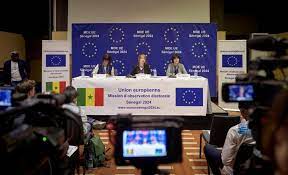APA – Dakar (Senegal) The European Union mission will present its conclusions two days after the election of 25 February in Senegal.
By Oumar Dembélé
Four days before the start of campaign for Senegal’s presidential election on 25 February, European Union (EU) observer teams are beginning to arrive in Africa’s westernmost country.
A core team of ten election experts has been in Senegal since 13 January. In total, there will be “more than 130 observers from the 27 EU member states, Switzerland, Norway and Canada” throughout the process, said Malin Björk, a member of the European Parliament, in Dakar on Tuesday 31 January.
At a press conference, the Swede outlined the mission she is leading to a large number of Senegalese and foreign journalists.
“These elections belong to the people of Senegal. We want to contribute, through our objective assessment, to a democratic electoral process in which all voices are heard and the choices of the Senegalese voters are respected,” said Malin Björk, promising that despite the many controversies, the EU EOM “will be impartial, independent and will not interfere in the electoral process.”
Having already held “talks with the heads of the Directorate General of Elections (DGE) and the National Autonomous Electoral Commission (CENA),” she promises to meet with candidates, the media and civil society.
“The mission will listen very carefully to all parties involved to find out how they assess the electoral process, the political and legal context and respect for fundamental freedoms, including the freedom to stand as a candidate and campaign freely. We will listen to their concerns and expectations for an election that will shape Senegal’s future. The mission also wishes to meet with all presidential candidates, wherever they may be and whatever their current situation,” she noted.
“Steps” taken to meet Sonko’s candidate
Ms Björk said that her teams were “taking the necessary steps” to meet the jailed candidate, Bassirou Diomaye Faye, chosen by opposition leader Ousmane Sonko, who is also in prison and whose candidacy was annulled, to represent the sovereignist project of the disbanded Pastef Les Patriotes party.
This opposition party is one of the favourites to win the election, while the ruling coalition has chosen Prime Minister Amadou Ba, who describes himself as the “candidate of continuity” with the work of outgoing President Macky Sall (2012-2024), whom he hopes to succeed.
Two days after the presidential election, on 27 February 2024, the EU EOM will publish its initial findings in a preliminary statement to be presented at a press conference. The mission will remain in Senegal until the end of the electoral process, including in the event of a possible second round, stresses Malin Björk, adding that the EOM has “32 long-term observers who will be deployed in all regions of the country next Friday.”
A few days before the elections, “64 short-term observers will join the mission,” as well as a delegation of MEPs and some twenty diplomats based in Dakar, she noted.
The EOM will take only “a few weeks” to present a final report after carrying out an “in-depth and long-term analysis” of the electoral process in accordance with Senegalese law, international and regional commitments ratified by Senegal and good electoral practice, the Swedish MEP emphasised.
ODL/ac/lb/as/APA


